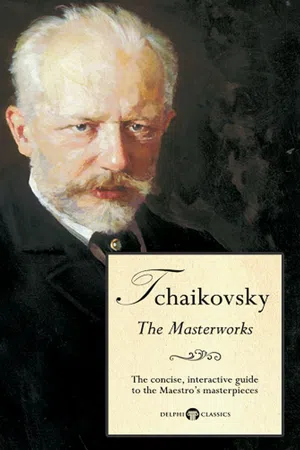
- English
- ePUB (mobile friendly)
- Available on iOS & Android
Delphi Masterworks of Pyotr Ilyich Tchaikovsky (Illustrated)
About this book
The Russian composer Pyotr Ilyich Tchaikovsky was a monumental figure of the Romantic period, whose works are among the most popular music in the classical repertoire. Celebrated for his melodic ingenuity, impressive harmonies and colourful, picturesque orchestration, Tchaikovsky's works evoke a profound emotional response. He was the first Russian composer to produce music that made a lasting impression internationally, leading the way for future generations of aspiring composers. Delphi's Great Composers Series offers concise illustrated guides to the life and works of our greatest composers. Analysing the masterworks of each composer, these interactive eBooks include links to popular streaming services, allowing you to listen to the pieces of music you are reading about. Evaluating the masterworks of each composer, you will explore the development of their works, tracing how they changed the course of music history. Whether a classical novice or a cultivated connoisseur, this series offers an intriguing overview of the world's most famous and iconic compositions. This volume presents Tchaikovsky's masterworks in succinct detail, with informative introductions, accompanying illustrations and the usual Delphi bonus features. (Version 1)
* Concise and informative overview of Tchaikovsky's masterworks
* Learn about the classical pieces that made Tchaikovsky a celebrated composer
* Links to popular streaming services (free and paid), allowing you to listen to the masterpieces you are reading about
* Features a special 'Complete Compositions' section, with an index of Tchaikovsky's complete works and links to popular streaming services
* Also features two biographies - explore Tchaikovsky's intriguing musical and personal life
* Includes Tchaikovsky's brother seminal biography, including the composer's letters - spend hours exploring Tchaikovsky's personal correspondence
Please visit www.delphiclassics.com to browse through our range of exciting eBooks
CONTENTS:
The Masterworks
Symphony No. 1 in G minor, Op. 13
Six Romances, Op. 6
Romeo and Juliet, TH 42
String Quartet No. 1 in D Major, Op. 11
Piano Concerto No. 1 in B-Flat Minor, Op. 23
Swan Lake, Op. 20
The Seasons, Op. 37a
Symphony No. 4 in F Minor, Op. 36
12 Morceaux, Op. 40
Eugene Onegin, Op. 24
Liturgy of St. John Chrysostom, Op. 41
Violin Concerto in D Major, Op. 35
1812 Overture, Op. 49
Serenade for Strings in C Major, Op. 48
Manfred Symphony in B minor, Op. 58
Symphony No. 5 in E Minor, Op. 64
The Sleeping Beauty, Op. 66
The Nutcracker, Op. 71
Symphony No. 6 in B Minor, Op. 74
Complete Compositions
Index of Tchaikovsky's Compositions
The Biographies and Letters
The Life and Letters of Peter Ilich Tchaikovsky by Modeste Tchaikovsky
Brief Biography: Peter Ilich Tschaikovsky
Please visit www.delphiclassics.com to learn more about our wide range of exciting titles
Frequently asked questions
- Essential is ideal for learners and professionals who enjoy exploring a wide range of subjects. Access the Essential Library with 800,000+ trusted titles and best-sellers across business, personal growth, and the humanities. Includes unlimited reading time and Standard Read Aloud voice.
- Complete: Perfect for advanced learners and researchers needing full, unrestricted access. Unlock 1.4M+ books across hundreds of subjects, including academic and specialized titles. The Complete Plan also includes advanced features like Premium Read Aloud and Research Assistant.
Please note we cannot support devices running on iOS 13 and Android 7 or earlier. Learn more about using the app.
Information
Symphony No. 1 in G minor, Op.13


Table of contents
- Title page
- COPYRIGHT
- The Masterworks
- Symphony No. 1 in G minor, Op.13
- Six Romances, Op.6
- Romeo and Juliet, TH 42
- String Quartet No. 1 in D Major, Op.11
- Piano Concerto No. 1 in B-Flat Minor, Op.23
- Swan Lake, Op.20
- The Seasons, Op.37a
- Symphony No. 4 in F Minor, Op.36
- 12 Morceaux, Op.40
- Eugene Onegin, Op.24
- Liturgy of St. John Chrysostom, Op.41
- Violin Concerto in D Major, Op.35
- 1812 Overture, Op.49
- Serenade for Strings in C Major, Op.48
- Manfred Symphony in B minor, Op.58
- Symphony No. 5 in E Minor, Op.64
- The Sleeping Beauty, Op.66
- The Nutcracker, Op.71
- Symphony No. 6 in B Minor, Op.74
- Complete Compositions
- Index of Tchaikovsky’s Compositions
- The Biographies and Letters
- The Life and Letters of Peter Ilich Tchaikovsky by Modest Tchaikovsky
- Brief Biography: Peter Ilich Tchaikovsky
- The Delphi Classics Catalogue